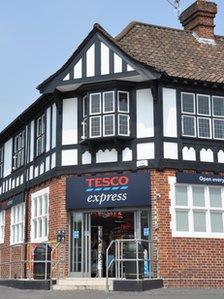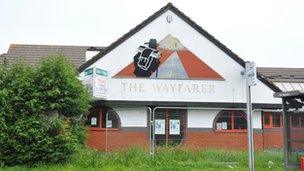Is there a trend for pubs being turned into supermarkets?
- Published

Bristol Civic Society wanted the Friendship Inn protected
Fancy a pint at the pub? Or would you rather pick up a bottle of wine at the local supermarket?
In Bristol there is a chance your local pub has become a supermarket.
A total of 62 pubs have closed for good in the city and greater Bristol area since 2009. It is a similar story across the UK, with 12 pubs closing every week.
And according to the Bristol Pubs Group, there is a "growing trend" for them to reopen as convenience stores.
Pete Bridle, from the pubs group, said supermarkets appeared to have "latched on to this locally", although retail giant Tesco denied it was targeting pubs.
The Co-operative Group, however, said it was interested in taking over vacant pubs as food stores if they met their requirements.
Mr Bridle said three pubs had recently become supermarkets in the Bristol area, permission had been given for two others to be demolished and replaced, and three others were rumoured to be the subject of planned takeovers.
The Cromwell in Congresbury has been flattened and replaced with a Tesco, despite a petition by local residents to stop it happening.
There was also a campaign to save the Friendship Inn, Knowle, with the Bristol Civic Society applying for it to be protected as a listed building.
The pub was thought of so fondly by residents that one neighbour asked new owner Tesco for the pub sign to go in her garden.
'Cheap booze'
John Payne, from Bristol Civic Society, said: "We were interested in it as a listed building, but our main concern was the change of use.
"A pub is - although it's really more a matter of opinion - more of a community use than a supermarket is.
"There are not many pubs in places like that and it seemed a shame to lose that one."
Mr Payne said that in his experience, however, there was more of a trend for turning closed pubs into homes.
"Pubs are under a lot of pressure. You can buy cheap booze in supermarkets and other places and take it home and drink it. In pubs you're paying a lot more," he said.
"It's a shame in many ways because people are sitting at home drinking out of cans instead of going to the pub and meeting other people.
"It's a difficult trend to counteract without changing the level of beer duty."
Permission has been granted for the Wayfarer, in Southmead, to be demolished and turned into retail units, and the Standard of England, also in Southmead, has already been replaced with a Tesco Express.
Wendy Jones, 47, who lives near the Standard of England site, said: "In the beginning people weren't happy about it because it had been there such a long time.
"People seem to have got used to the idea now. It's just a sign of the times."
A Tesco spokeswoman said the only two pubs in Bristol they had converted were the Standard of England and the Friendship Inn.
Both, she said, had been "sensitive developments" with many of the characteristics of the Friendship retained.
And she said both were "incredibly popular", attracting between 6,000 and 8,000 customers a week each.
'Back to life'
She said that in the case of the Cromwell, it had been closed for a number of years before it was demolished by a developer. She said Tesco leased the retail unit built in its place.
The spokeswoman dismissed talk of taking over the Crown Inn, in Longwell Green, which is opposite a Tesco Express store, as "pure rumour and speculation".
She added that there was "no strategy to target pubs".
"Our Express stores offer great value food, provide vital jobs and attract people to local high streets," she said.

Permission has been granted for the Wayfarer, in Southmead, to be demolished
"We select the location of our stores based on where we can best serve our customers. We are proud to bring significant investment to local communities and bring a range of disused sites back to life."
Mr Bridle said it was believed Co-op would be opening stores on the sites of both the Wayfarer, and the Lord Rodney, in Kingswood.
In a document submitted to Bristol planners regarding the Lord Rodney in February this year, the Co-operative was named in relation to an agreement to lease the land.
But a spokesman for the Co-operative Group said it was "not directly involved" in either site.
The spokesman said: "We are interested in public houses that come on to the market because they are no longer a going concern, if they are in the right location and the premises would convert."
According to Mr Bridle, suburban and rural areas have been worst hit by pub closures.
"There is a substantially large area with no pubs left at all in south east of Bristol," he said.
A report by the National Housing Federation in 2010 stated that village life in Britain was "dying out" because of rural pubs closing at a record rate.
Community asset
Supermarkets do not need planning consent to open a convenience store in an empty pub, making it a fairly easy change. The only applications they need to make are for things like cash machines and the shop frontage.
A Bristol City Council spokesman said pubs were seen as a community asset and added that it recognised the need to protect them.
This means that the need to protect will be considered when planning permission is required.
However, where no permission for change of use is required the council has no additional powers to intervene.
Bristol Pubs Group is lobbying councils in the area to adopt a stronger policy to protect community pubs.
"Not only does it take away a pub, it undermines the viability of other local traders," Mr Bridle said. "Pubs are the beating heart of many communities."
Bristol Campaign for Real Ale (Camra) worked with the council during a consultation on its Bristol Core Strategy to firm up the policy.
Mr Bridle said his group had also submitted comments on the proposed Bristol Central Area Action Plan - the planning blueprint that will determine the future of development in the city centre until 2026.
"We've been successful in adapting policy to give greater protection to pubs, but there are still some weaknesses in it. The problem is the greater planning law of the UK," he said.
"We intend to propose our neighbouring councils (Bath and North East Somerset, South Gloucestershire, North Somerset and Mendip District) follow suit in listening to our arguments."
- Published1 May 2012
- Published3 February 2012
- Published23 July 2011
- Published19 January 2011
- Published31 December 2010
- Published18 September 2010